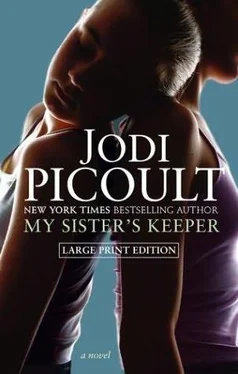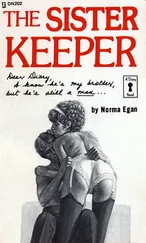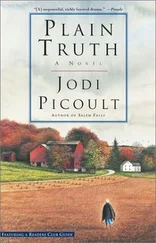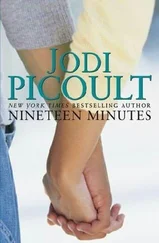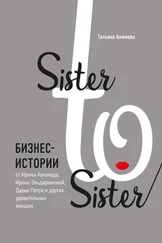Of course Anna should be honored for donating her bone marrow. Of course she deserves recognition. But the thought of rewarding someone for their suffering, frankly, never entered my mind. We've all been doing it for so long.
They both glance up when I come through the doorway. "Look at what Daddy got me!" Anna says.
I hold out the plastic dosage cup, a poor second-best.
Shortly after ten o'clock, Brian brings Anna to Kate's room. She moves slowly, like an old woman, leaning on Brian for support. The nurses help her into a mask and gown and gloves and booties so that she can be allowed in—a compassionate breach of protocol, as children are not usually allowed to visit protective isolation.
Dr. Chance stands beside the IV pole, holding up the bag of marrow. I turn Anna so that she can see it. "That," I tell her, "is what you gave us."
Anna makes a face. "It's gross. You can have it."
"Sounds like a plan," Dr. Chance says, and the rich ruby marrow begins to feed into Kate's central line.
I place Anna on the bed. There is room for both of them, shoulder to shoulder. "Did it hurt?" Kate asks.
"Kind of." Anna points to the blood running through the plastic tubes into the slit in Kate's chest. "Does that?"
"Not really." She sits up a little. "Hey, Anna?”
“Yeah?"
"I'm glad it came from you." Kate reaches for Anna's hand and places it just below the central line's catheter, a spot that falls precariously near her heart.
Twenty-one days after the bone marrow transplant, Kate's white cell counts begin to rise, proof of engraftment. To celebrate, Brian insists that he is taking me out to dinner. He arranges for a private-duty nurse for Kate, makes reservations at XO Cafe, and even brings me a black dress from my closet. He forgets pumps, so I wind up wearing my scruffy hiking clogs with it.
The restaurant is nearly full. Almost immediately after we are seated, the sommelier comes to ask if we want wine. Brian orders a Cabernet Sauvignon.
"Do you even know whether that's red or white?" I do not think, in all these years, I have seen Brian drink anything but beer.
"I know it's got alcohol in it, and I know we're celebrating." He lifts his glass after the sommelier pours it. "To our family," he toasts.
We click glasses and take sips. "What are you getting?" I ask.
"What do you want me to get?"
"The filet. That way I can taste it if I get the sole." I fold my menu. "Did you hear the results of the last CBC?"
Brian looks down at the table. "I was sort of hoping that we could come here to get away from all that. You know. Just talk."
"I'd like to talk," I admit. But when I look at Brian, the information that leaps to my lips is about Kate, not us. I have no call to ask him about his day—he has taken three weeks off from the station. We are connected by and through sickness.
We fall back into silence. I look around XO Cafe and notice that chatter happens mostly at tables where the diners are young and hip. The older couples, the ones sporting wedding bands that wink with their silverware, eat without the pepper of conversation. Is it because they are so comfortable, they already know what the other is thinking? Or is it because after a certain point, there is simply nothing left to say?
When the waiter arrives to take our order, we both turn eagerly, grateful for someone who keeps us from having to recognize the strangers we have become.
We leave the hospital with a child who is different from the one we brought in. Kate moves cautiously, checking the drawers of the nightstand for anything she might have left behind. She has lost so much weight that the jeans I brought do not fit; we have to use two bandannas knotted together as a makeshift belt.
Brian has gone down ahead of us to bring the car around. I zip the last Tiger Beat and CD into Kate's duffel bag. She pulls a fleece cap on over her smooth, bare scalp and winds a scarf tight around her neck. She puts on a mask and gloves; now that we are venturing out of the hospital, she is the one who will need protection.
We walk out the door to the applause of the nurses we have come to know so well. "Whatever you do, don't come back and see us, all right?" Willie jokes.
One by one, they walk up to say their good-byes. When they have all dispersed, I smile at Kate. "Ready?"
Kate nods, but she doesn't step forward. She stands rigid, fully aware that once she sets foot outside this doorway, everything changes. "Mom?"
I fold her hand into mine. "We'll do it together," I promise, and side by side, we take the first step.
The mail is full of hospital bills. We have learned that the insurance company will not talk to the hospital billing department, and vice versa, but neither one thinks that the charges are accurate—which leads them to charge us for procedures we shouldn't have to cover, in the hopes that we are stupid enough to pay them. Managing the monetary aspect of Kate's care is a full-time job that neither Brian nor I can do.
I leaf through a grocery store flyer, an AAA magazine, and a long-distance rate announcement before I open the letter from the mutual fund. It's not something I really pay attention to; Brian usually manages finances that require more than basic checkbook balancing. Besides, the three funds we have are all earmarked for the kids' education. We are not the sort of family that has enough spare change to play the stock market.
Dear Mr. Fitzgerald:
This is to confirm your recent redemption from fund #323456, Brian D. Fitzgerald Custodian for Katherine S. Fitzgerald, in the amount of $8,369.56. This disbursement effectively closes the account.
As banking errors go, this is a pretty major one. We've been off by pennies in our checking account, but at least I've never lost eight thousand dollars. I walk out of the kitchen and into the yard, where Brian is rolling an extra garden hose. "Well, either someone at the mutual fund screwed up," I say, handing the letter to him, "or the second wife you're supporting is no longer a secret."
It takes him one moment too long to read it, the same moment that I realize that this is not a mistake after all. Brian wipes his forehead with the back of one wrist. "I took that money out," he says.
"Without telling me?" I cannot imagine Brian doing such a thing. There have been times, in the past, where we dipped into the children's accounts, but only because we were having a month too tight to swing the cost of groceries and the mortgage, or because we needed the down payment for a new car when our old one had finally been put to rest. We'd lie awake in bed feeling guilt press down like an extra quilt, promising each other that we would put that money right back where it belonged as soon as humanly possible.
"The guys at the station, they tried to raise some money, like I told you. They got ten thousand dollars. With this added to it, the hospital's willing to work out some kind of payment plan for us."
"But you said—"
"I know what I said, Sara."
I shake my head, stunned. "You lied to me?"
" I didn't—"
"Zanne offered—"
"I won't let your sister take care of Kate," Brian says. "I'm supposed to take care of Kate." The hose falls to the ground, dribbles and spits at our feet. "Sara, she's not going to live long enough to use that money for college."
The sun is bright; the sprinkler twitches on the grass, spraying rainbows. It is far too beautiful a day for words like these. I turn and run into the house. I lock myself in the bathroom.
A moment later, Brian bangs on the door. "Sara? Sara, I'm sorry."
I pretend I can't hear him. I pretend I haven't heard anything he's said.
At home, we all wear masks so that Kate doesn't have to. I find myself checking her fingernails while she brushes her teeth or pours cereal, to see if the dark ridges made by the chemo have disappeared—a sure sign of the bone marrow transplant's success. Twice a day I give Kate growth factor shots in the thigh, a necessity until her neutrophil count tops one thousand. At that point, the marrow will be reseeding itself.
Читать дальше
